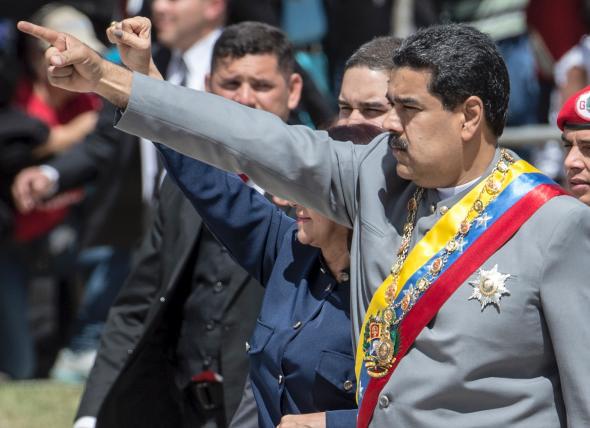Venezuela’s already beleaguered democracy was dealt a near-fatal blow Wednesday, when the country’s Supreme Court usurped what power remained in the democratically elected National Assembly, leaving President Nicolás Maduro with virtually unchecked authority. The country’s top court also overturned most of the decisions made by the legislature since the opposition party to Maduro’s government took control of the chamber in late 2015. “As long as the situation of contempt in the National Assembly continues, this constitutional chamber guarantees congressional functions will be exercised by this chamber or another chosen organ,” the court said in its ruling.
The move comes after Maduro—the handpicked successor to President Hugo Chávez, who died in March 2013—and his party have slowly chipped away at the legitimacy and capacity of the legislature. In 2015, when the opposition democratically won control of the National Assembly, the Supreme Court, packed with Maduro loyalists, denied four representatives from taking office due to voting irregularities, keeping the opposition from a supermajority in the body. Over the legislature’s opposition, Maduro, backed by the Supreme Court, then declared emergency powers. As the bottom fell out of the country’s economy and protests flared across the country, the court went on to strip the assembly of its budgeting power. More recently, Maduro and his allies have consolidated power, detained political prisoners without trial, suppressed protesters’ dissent, stifled the media, and postponed local elections.
From the New York Times:
Critics say a long litany of other moves by the government are taking a toll on Venezuela’s democracy. Perhaps most visible to Venezuelans was an effort last year to hold a recall referendum against the president, whose popularity is sinking along with the country’s collapsing economy. While such a referendum was permitted by the country’s Constitution, and highly favored in polls, Mr. Maduro alternatively called the effort illegal or a coup staged by his opponents. In October, a lower court suspended the process on the grounds that there had been irregularities in the gathering of signatures.
Meanwhile, political prisoners continued to be arrested. In January, Mr. Maduro established a new “anti-coup commando” to round up political dissidents accused of treason. The group has taken aim at members of the opposition, arresting many, including a city councilman from central Venezuela and a deputy lawmaker in the National Assembly. In February, after CNN en Español, the network’s Spanish language channel, broadcast an investigation that linked Venezuela’s vice president to a passport fraud scheme in the Middle East, Mr. Maduro ordered the channel off the air. The government has blocked the Caracas bureau chief of The New York Times from entering the country since October.
“Brazil, Argentina, Mexico, Colombia, Chile, Guatemala and Panama expressed strong concerns while Peru withdrew its envoy after what it termed a rupture of democracy,” according to Reuters. “The United States described the move as a ‘serious setback for democracy in Venezuela’ while the European Union called for a ‘clear electoral calendar’ going forward.”
